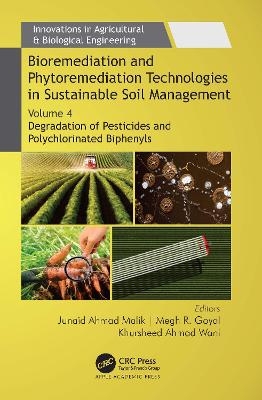
Bioremediation and Phytoremediation Technologies in Sustainable Soil Management
Apple Academic Press Inc. (Verlag)
978-1-77491-038-2 (ISBN)
This 4-volume set focuses on the use of microbial bioremediation and phytoremediation to clean up pollutants in soil, such as pesticides, petroleum hydrocarbons, metals, and chlorinated solvents, which reduce the soil's fertility and renders it unfit for plant growth. The volumes cover the many diverse eco-friendly microbial bioremediation and phytoremediation techniques for sustainable soil management.
Volume 4: Degradation of Pesticides and Polychlorinated Biphenyls addresses pesticide degradation, PCBs degradation, and genetic interventions. It begins by describing environmental pesticide degradation, mechanisms and sustainability, microbes and microbial enzymes, plant microbe interactions, organophosphorus degradations and endosulfan degradation. It then goes on to discuss PCBs and degradation, cypermethrin, degradation by Phanerochaete chrysosporium, and carvone and surfactants for degradation of PCBs. The book also advocates for genetic systems for degradation of PCBs and pesticides, with discussion of the different advantages and disadvantages for each strategy and the various techniques.
Other volumes in the 4-volume set:
• Volume 1: Fundamental Aspects and Contaminated Sites
• Volume 2: Microbial Approaches and Recent Trends
• Volume 3: Inventive Techniques, Research Methods, and Case Studies
Together, these four volumes provide in-depth coverage of the mechanisms, advantages, and disadvantages of the bioremediation and phytoremediation technologies for safe and sustainable soil management.
Junaid Ahmad Malik, PhD, is a Lecturer with the Department of Zoology at Government Degree College, Bijbehara, Kashmir (J&K), India. He has published research articles and technical papers in international journals and has authored and edited books, book chapters, and popular editorial articles. He also serves as an editor and reviewer for several journals. Megh R. Goyal, PhD, PE, is a prolific author and editor. He is a retired professor from the College of Engineering at the University of Puerto Rico. A former soil conservation inspector, Dr. Goyal was proclaimed as the “Father of Irrigation Engineering in Puerto Rico for the twentieth century” by the ASABE, Puerto Rico Section, for his pioneering work on micro irrigation, evapotranspiration, agroclimatology, and soil and water engineering. Khursheed Ahmad Wani, PhD, is a Lecturer in the Department of Environmental Science, Government Degree College, Bijbehara, J & K, India, and is actively involved in teaching and research. He was formerly Assistant Professor in the Department of Environmental Science ITM University, Gwalior, India. Dr. Wani has published research papers and book chapters and has edited several books. He has worked as principal investigator in research projects sanctioned by the Madhya Pradesh Council of Science and Technology.
PART 1: MICROBIAL DEGRADATION OF PESTICIDES 1. Environmental Pesticide Degradation: Mechanisms and Sustainability 2. Microbial Degradation of Pesticides 3. Microbial Remediation of Persistent Agro-Chemicals by Soil Bacteria 4. Microbes and Microbial Enzymes for Degradation of Pesticides 5. Plant-Microbe Interactions in Agro-Ecological Perspectives and Degradation of Pesticides 6. Microbial Degradation of Organophosphorus Pesticides 7. Microbial-Assisted Degradation of Endosulfan PART 2: POLYCHLORINATED BIPHENYL (PCBS) DEGRADATION 8. Degradation Mechanisms of Polychlorinated Biphenyls (PCBs) in the Environment 9. Bioremediation of Polychlorinated Biphenyls (Plastics) and Cypermethrin 10. Degradation of Polychlorinated Biphenyls by Phanerochaete chrysosporium 11. Role of Carvone and Surfactant Producing Bacteria in Bioremediation of Polychlorinated Biphenyls PART 3: GENETIC INTERVENTION 12. Genetic Systems in Soil Bacteria for Degradation of Polychlorinated Biphenyls 13. Toxicity and Genetic Basis of Microbial Degradation of Organophosphorus Pesticides
| Erscheinungsdatum | 27.06.2022 |
|---|---|
| Reihe/Serie | Innovations in Agricultural & Biological Engineering |
| Zusatzinfo | 30 Tables, black and white; 8 Line drawings, color; 34 Line drawings, black and white; 2 Halftones, color; 4 Halftones, black and white; 10 Illustrations, color; 38 Illustrations, black and white |
| Verlagsort | Oakville |
| Sprache | englisch |
| Maße | 156 x 234 mm |
| Gewicht | 471 g |
| Themenwelt | Schulbuch / Wörterbuch |
| Naturwissenschaften ► Biologie ► Botanik | |
| Weitere Fachgebiete ► Land- / Forstwirtschaft / Fischerei | |
| ISBN-10 | 1-77491-038-1 / 1774910381 |
| ISBN-13 | 978-1-77491-038-2 / 9781774910382 |
| Zustand | Neuware |
| Haben Sie eine Frage zum Produkt? |
aus dem Bereich


